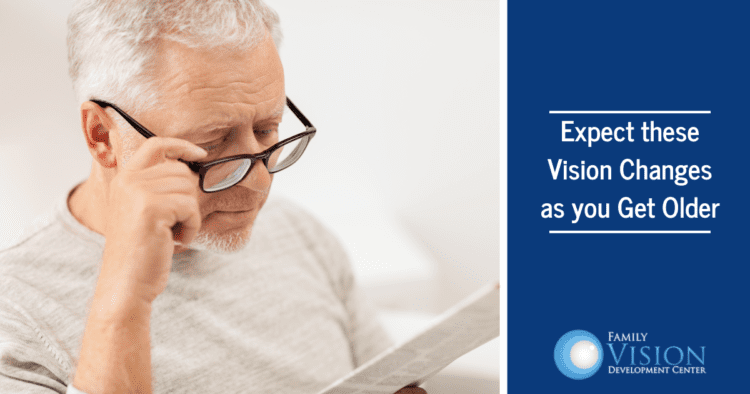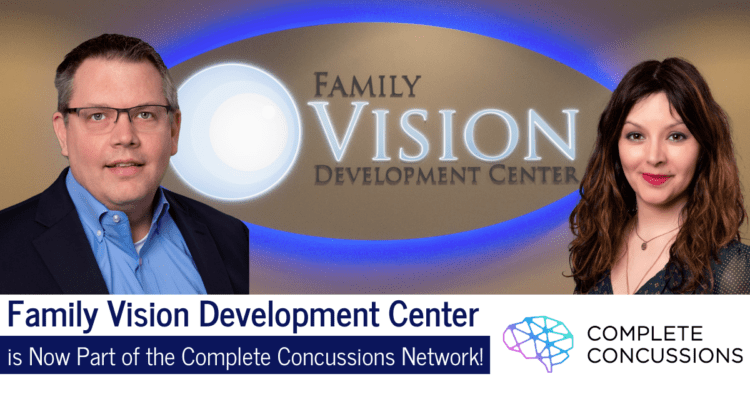Some things just get better with age – like wine, cheese or even a lasting friendship! But we can’t always say the same for our vision. Unfortunately, aging can bring about a number of visual concerns. Some can be serious, but others, like those below, are often simply an effect of getting older. On the bright side, while you may not be able to completely avoid these common issues, there are ways to help minimize the effects.
Vision Issues that Tend to Worsen with Age
- Presbyopia – this is the gradual loss of the eyes’ ability to focus on close objects or small print. Indeed, it tends to be one of the most common complaints of getting older, as reading becomes much more difficult and headaches become more common as a result. For mild cases of presbyopia, simply holding things farther away when reading or increasing the font size on your screen can do the trick. However, as it progresses, glasses or contacts in the appropriate prescription may be needed for comfortable vision.
- Dry eyes – this occurs when there are not enough tears, or insufficient quality of tears, lubricating the eyes. This condition is very common in older adults. In fact, the majority of people over age 65 experience some level of dry eyes. However, lubricating tears are important to keep the surface of the eyes smooth, clear and comfortable, as well as wash away any foreign matter or debris. Eye drops or artificial tear solutions can help combat symptoms. Better yet, to prevent a bad case of dry eyes, you can stay hydrated, use a humidifier at home and wear sunglasses
- Cataracts – cataracts are a clouding of the eye lens that causes changes in vision. For example, you may experience blurry or cloudy vision, double vision, light sensitivity or you may see halos around lights. Unfortunately, the biggest risk factor for developing cataracts is age, so you can’t avoid that. However, protecting your eyes with sunglasses or brimmed hats, quitting smoking and eating a nutrient-rich diet of fruits and vegetables can help to combat other known risk factors. And if they become too bothersome, they can be easily removed through a common surgery.
Eye Care at Every Age
No matter your age, an annual vision exam is essential in order to maintain proper eye health. Many eye diseases start without any symptoms and therefore go unnoticed for long periods of time, making treatment options more difficult in some cases. A comprehensive eye exam is the best way to detect these diseases in their early stages when treatment is most effective for preventing vision loss. Additionally, regular visits help us to quickly identify unusual vision changes, as well as provide guidance throughout the years to keep your vision strong for your lifetime.
It’s never too late to start taking proper care of your vision! The caring team at Family Vision Development Center is dedicated to providing the best vision care to all of our patients, at every age. Be sure to contact our Aurora location at 630-862-2020 to schedule an appointment today.
Family Vision Development Center is a full-service vision center offering innovative vision therapy services, post-concussive vision rehabilitation, comprehensive vision exams for eyeglasses and contact lenses, management of ocular diseases including glaucoma, diabetes, macular degeneration and cataracts, and a state-of-the-art optical center offering the latest designs in eyewear. We are dedicated to keeping our patients comfortable and well-informed and we will explain every exam and procedure and answer all of your questions. We accept both scheduled and emergency appointments, and offer convenient financing and insurance options to ensure that high-quality vision care is available and affordable to all of our patients.
Family Vision Development Center is excited to announce our new affiliation with Complete Concussions! Through this new relationship we are confident you will receive the most comprehensive concussion care, by coordinating important instructions and information amongst your providers.
Complete Concussions Overview
Coordinating concussion care can be difficult. But it is important for all of your concussion providers to be aware of other care you may be receiving. Indeed, this is the most effective way to ensure proper treatment and recovery. Complete Concussions is a global network of concussion care providers with one centralized location for patient referrals, care instructions, follow-up protocols and more. Their primary focus is concussion care and management using a network of specialists, clinics and providers worldwide. This network allows your concussion care to be coordinated among providers, coaches, etc. by gathering all important information in one place.
Family Vision Development Center as a Partner
Family Vision Development Center is proud to be included in the selection of trusted providers in the Complete Concussions network. Our concussion care professionals are trained in advanced neuro-optometric vision rehabilitation treatments that are often necessary following a concussion. Our inclusion in this network will allow primary care physicians, physical therapists, parents and others who may not know where to turn for these specialized services, to easily locate and contact our office. Additionally, they will be able to access progress updates, request more information, and coordinate long-term solutions.
Coordinating your Vision Therapy Following a Concussion
A concussion can cause changes to your vision. When this happens, it is known as post-concussive vision syndrome. A person who experiences a blow to the head that results in a concussion could experience problems such as:
- Eye focusing – not being able to quickly and easily see an object clearly (objects look blurry)
- Eye Movements and Tracking – not able to easily follow a moving object from one spot to another, or switch fixation from one object to another. Sometimes this can be reported by students saying that words are moving on the page.
- Depth Perception Issues – difficulty with accurately judging the distance between objects.
- Eye Teaming – not able to get both eyes to work together to focus on an object, often reported as double vision
- Peripheral Vision Loss – problems with your wide-angle field of vision, or feeling like you’re looking through a narrow tube
- Fatigue – more intense than normal, and not alleviated by rest
- Headaches – headache pain is common following a head injury and can range from dull to pounding or throbbing
- Memory – long-term or short-term memory loss can occur immediately following a concussion or can develop weeks, months or years after
Vision therapy is an extremely effective form of treatment for post-concussive vision syndrome that occurs following a head injury. This type of individualized neuro-optometric vision rehabilitation helps to retrain the visual system to restore proper communication between the eyes and brain. Any of the above visual issues can affect athletic or school performance, and precautions should be taken to ensure the safety and well-being of an affected student. Coordinated concussion care can alert parents, coaches and doctors when it is safe for an athlete to return to play or a student to return to normal classroom activities.
To learn more about our new partnership, get more information about concussion care or to schedule an appointment, contact us at 630-862-2020.
Family Vision Development Center is a full-service vision center offering innovative vision therapy services, post-concussive vision rehabilitation, comprehensive vision exams for eyeglasses and contact lenses, management of ocular diseases including glaucoma, diabetes, macular degeneration and cataracts, and a state-of-the-art optical center offering the latest designs in eyewear. We are dedicated to keeping our patients comfortable and well-informed and we will explain every exam and procedure and answer all of your questions. We accept both scheduled and emergency appointments, and offer convenient financing and insurance options to ensure that high-quality vision care is available and affordable to all of our patients.



